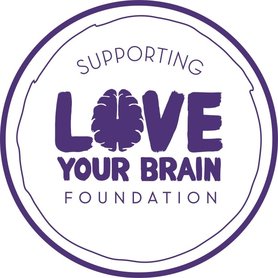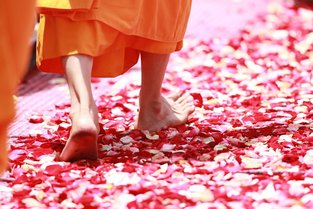 Five Keys Yoga is participating in #MindfulMarch again this year! We'll be offering donation-based classes, with proceeds going to the Love Your Brain Foundation. The LYB Foundation provides yoga and guided mindfulness meditation to survivors of Traumatic Brain Injury and their caregivers. Both of our #MindfulMarch classes will include yoga and a mindfulness meditation. Beginners are welcome! #MindfulMarch classes at Five Keys Yoga March 10th, 10-11am March 28th, 5:30-6:30pm* *Class on the 28th includes complementary chiropractic adjustment with Dr. Taylor Clifford But you don't have to wait for March to get started on mindfulness. There are oodles of guided meditations on Youtube, the Headspace app, etc. (not to mention some on this very blog...) to give you a sense of the various ways of meditating. You might feel ready to start right now, but aren't sure what to expect or don't know how mindfulness is different than meditation. Never fear! Mindfulness is just a type of meditation. All you need is a relatively quiet space, where you can remain undisturbed for a few minutes. Once you're ready to give it a go, here are four tips. Learn to Ride the Wave of Thoughts The process of mindfulness is simple, but challenging. Mindfulness only requires an awareness of thoughts moving through the mind. As mindfulness practitioners, we are instructed to watch our thoughts without "getting involved in them". Practically speaking, all that means is trying to keep the mind from getting attached to certain thoughts or lines of thinking. It also means we eschew cultivating feelings of judgement about the content of our thoughts or the ability to control our thoughts. Mindfulness is often compared to surfing - learning to ride the wave without getting caught up within it. Often I hear statements like, "meditation isn't for me, my thoughts just won't stand still." My response is no one's do. Even great masters of meditation say that their thoughts are unceasing (until our brain ceases to be). They've simply learned how to slow the pace of thoughts, direct attention to thought patterns they want to be having, and away from thought patterns they do not want to be having. They experience thoughts without identifying with them. In other words, they've developed better control over their own minds. That is mindfulness; not an empty head. Develop Patience Sometimes I meet practitioners who are just beginning to practice but feel discouraged that they are unable to control their mind like a great master. (Note that I am not a great master either.) Would you expect to be able to speak a language fluently with just a few lessons? Mindfulness is a skill that needs proper development to flourish. One of the Yoga Sutras (an ancient yoga guidebook) says "practice becomes firmly grounded when well attended to for a long time, without break and in all earnestness." ( I.14) So we must develop patience for ourself and the process. Patience is not easy, especially living in the U.S. We're used to getting most of the things we want and need relatively quickly. Because many of us haven't had much of a chance to practice our patience skills, meditation becomes a prime way to develop those as well. We learn to sit through thoughts going through the mind like "I need to send that email right now," "something smells good in the kitchen" or "I can't sit here with that noise outside," without reacting right away. This develops an ability to pause after experiencing a thought. We may decide to take the action our first impulse suggested or we may take a different one. This pause encourages us to react using our "wisdom brain" (which is related to the pre-frontal cortex) and make choices that support our larger goals, rather than choices that are only expedient at the moment. Be Consistent and Focused For those of us who want to accelerate the process, the Sutras also say "to the keen and intent practitioner [mastery] comes very quickly...The time necessary for success further depends on whether the practice is mild, medium or intense." (I.21-22) So one sure way to speed up your practice is to be very consistent and focused. Would you expect to learn to play the piano well, by practicing with lots of distractions in the background or only once in a while? Of course not. For some reason, we think we should be good at mindfulness without the commitment and dedication that other skills take. Unless we were very lucky, we weren't taught to practice mindfulness by our parents, in school, or at our job. So often this talent lies dormant until the right teacher (person or otherwise) arrives. Start small - with just five minutes or so - but be consistent about practicing regularly and minimize distractions, both outside and inside yourself. When you've developed a short routine, you will learn that meditating is enjoyable. Although meditation can bring up unpleasant thoughts and emotions, especially in the beginning, usually it feels really great to truly do nothing. When else do you get the chance to just sit still without any expectations? Once you've taught yourself how good it feels to meditate, you'll start to actively crave it. And these benefits you develop in your mind - patience, consistency, focus - will inevitably begin to bleed into your life beyond meditation. Practice Mindfulness Outside of Formal Meditation Another way to intensify a mindfulness practice is to cultivate a mindful attitude outside of formal meditation practice. To approach each thought, word, and behavior with gentle curiosity. It's like watching your own mind play out like a movie. Sure, we may feel happiness, anger, joy, fear, or sadness while we're watching "the movie". But when we go to the movies, we usually don't obsess over certain plot points or pieces of dialogue, as we do over the thoughts in our head. We watch what's happening, acknowledge how we feel, and move on to the next scene. Later, we might analyze what happened and determine how to improve things in the future. But we do so with an air of detachment. We can live our whole lives like that - being present to what is actually happening in the moment; not pushing emotion or thoughts away, nor holding onto them; and letting go of the past, in service of the future. If you'd like to be guided through a mindfulness meditation in person, come to one of our donation-based #MindfulMarch classes!
7 Comments
3/16/2023 05:03:27 pm
I like what you said about minimizing distractions during yoga. My wife and I need to get more active. We'll have to try yoga out.
Reply
5/17/2023 04:27:31 am
This article offers four valuable tips for beginners in mindfulness practice. It emphasizes the importance of observing thoughts without attachment or judgment, comparing it to surfing the waves of the mind. It highlights the need for patience in developing mindfulness skills and the benefits of cultivating consistency and focus in practice. Additionally, it suggests extending mindfulness to daily life, approaching thoughts and behaviors with curiosity and detachment. Overall, the article provides practical guidance for those interested in starting their mindfulness journey.
Reply
Leave a Reply. |
Archives
July 2024
About
Just some thoughts about yoga as I go... Categories
All
|
FIVE KEYS YOGA
|
WHAT OUR CLIENTS SAYFive Keys is fantastic! The studio is lovely and soothing, and the teachers are very caring and attentive. |
I've ... probably been to 25 different yoga studios. This is one of the most welcoming, calming spaces with very talented instructors. |
I love this yoga studio. It's a great balance of a good workout and relaxation and feels like a real community. |
An ideal studio for someone new to yoga. |

 RSS Feed
RSS Feed
